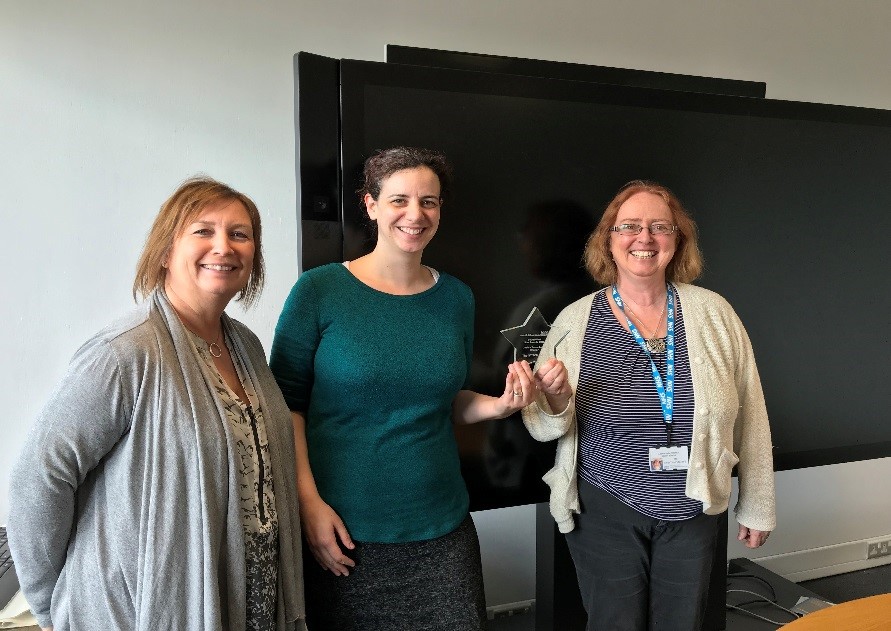Another great year for the Improving Care in Self-Harm HIT
Salena Williams and Sue Dursley, Co-Directors of the Improving Care in Self-Harm Health Integration Team (STITCH HIT) give an update on the HIT's activities in 2017-18.
- 19th April 2018
Salena Williams and Sue Dursley, Co-Directors of the Improving Care in Self-Harm Health Integration Team (STITCH HIT) give an update on the HIT’s activities in 2017-18.
This has been another fantastic year for the Improving Care in Self-Harm Health Integration Team (STITCH), culminating in March 2018 with STITCH Director Salena Williams addressing the All Party Parliamentary Group on Suicide and Self-harm Prevention.
Salena wrote Bristol’s citywide suicide prevention strategy, with help from STITCH members and many other partners across the city. The team won the Health Education England South West Star Award for our training with patients and people with lived experience.

As well as delivering training with STITCH, our patient and public involvement lead Naomi Salisbury (pictured centre, above, with Sue Dursley on the left, and Salena Williams on the right) is contributing to national standards. She has become an expert group reference member of the National Collaborating Centre for Mental Health, working on NHS Health Education England’s Self-harm and Suicide Prevention Competence Framework.
The Bristol Self-harm Surveillance Register enters its seventh year, giving us a long-term view of STITCH’s impact on care, quality and reductions in self-harm and suicide. We have struggled to identify long-term funding for the register. Because of these funding uncertainties we have sadly lost one of our long-term members, Peter Kennedy-Chapman. However, NIHR CLAHRC West have agreed to provide support for 2018-19.
We have also worked closely with Professor Gene Feder’s team to investigate the levels of domestic violence amongst self-harm patients.
Improvements in clinical care
The extended self-harm outpatient clinic has now been piloted for a year. This specialised psychodynamic clinic was for people who self-harmed and presented to the Emergency Department. It was run by Professor Paul Moran and two clinical nurse specialists, aiming to reduce repeat attendance and suicide risk. The team are now evaluating the clinic.
Working with our patient and public involvement leads Naomi Salisbury and Lisa Foote, Clinical Nurse Specialist Sue Dursley has managed and directed STITCH’s GP workstream. They have targeted areas of deprivation for intervention via GP surgeries to enhance assessment and care for self-harm patients after a hospital admission. We have created SASHA, a self-harm aide memoire for GPs, to help them look for signs and symptoms of distress and find out where help is on offer.
The Self-harm App, DistrACT was launched in October, led by local GP Dr Knut Schroeder from Expert Self-Care. DistrACT aims to help anyone who self-harms or has suicidal thoughts to understand their difficulties better, understand what happens when they come to A&E, and to raise awareness of all the services around and how they can help. Several members of STITCH contributed to the development of the app.
Both personal support plans (PSPs) for patients and staff training continues in Bristol Royal Infirmary A&E, and has extended to Southmead and Weston General Hospitals. These plans have had considerable impact on the Commissioning for Quality and Innovation (CQUIN) by reducing self-harm attendances at A&E. We have won awards this year for both personal support plans and training. We have contacted South Bristol Community Hospital and hope to provide training for them in the coming year.
Research
Qualitative research looking at patients self-harming in the context of the recession and money worries – the HOPE project – has been completed and published in and submitted to medical journals. Members of STITCH have presented this work at Bristol City Council-led meetings, including a panel discussion with Deputy Mayor Asher Craig. The Clinical Commissioning Group (CCG) was so impressed with the work done by the HOPE project that it has made an application to NHS England for £345,000 to extend it.
Following NIHR CLAHRC West’s report ‘Extending the Liaison Psychiatry service at the Bristol Royal Infirmary: a before and after evaluation of the economic impact in accident and emergency attendances for self-harm’, which identified that the investment had resulted in savings of £170,000 per year, a fuller evaluation of the impact of CCG investment in self-harm services is underway, also led by CLAHRC West.
Another project with CLAHRC West looking at improving participation in self-harm research is completed and awaiting publication.
Published and submitted papers
Carroll R, Knipe D, Moran P, Gunnell D. Socioeconomic deprivation and the clinical management of self-harm: a small area analysis. Soc Psychiatry Psychiatric Epidemiol. 2017; 52:1475–1481. DOI: 10.1007/s00127-017-1438-1.
Opmeer B, Hollingworth W, Marques E, Margelyte R, Gunnell D. Extending the liaison psychiatry service in a large hospital in the UK: a before and after evaluation of the economic impact and patient care following ED attendances for self-harm. BMJ Open 2017; 21;7(8):e016906. DOI: 10.1136/bmjopen-2017-016906
Barnes M, Haase A, Bard A, Donovan JL, Davies R, Dursley S, Potokar J, Kapur N, Hawton K, O’Connor RC, Hollingworth W, Metcalfe C, Gunnell D. HOPE: Help for people with money, employment, benefit or housing problems: study protocol for a randomised controlled trial. Pilot Feasibility Stud. 2017; 3:44. DOI: 10.1186/s40814-017-0179-y.
Padmanathan P, Biddle L, Carroll R, Derges J, Potokar J, Gunnell D. Suicide and Self-Harm Related Internet Use A Cross-Sectional Study and Clinician Focus Groups. Crisis 2018
Dalton T, Knipe D, Feder G, Williams S, Gunnell D, Moran P Prevalence and correlates of domestic violence among people seeking treatment for self-harm: data from a regional self-harm register (submitted BJPsych Bull 2018)






